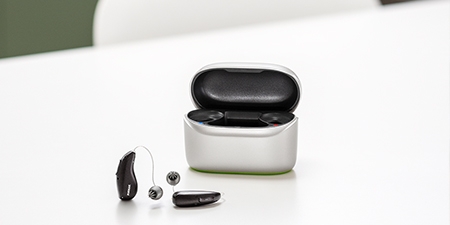A Comprehensive Guide to Hearing Loss and Dementia

A Comprehensive Guide to Hearing Loss and Dementia
10 min
Published April 21, 2025
Hearing Loss and Dementia
A world full of vibrant sounds doesn’t just bring joy – it also plays a crucial role in maintaining brain health. Studies suggest a significant connection between hearing loss and dementia, particularly as people age.
Research indicates that hearing loss not only impacts everyday communication but is also associated with cognitive decline over time. While the degree of this connection is still being explored, the links are clear enough to highlight the importance of awareness and action.
If you’ve ever wondered, “Does hearing loss cause dementia?” you’re not alone. Understanding this relationship can help protect your brain health and improve your overall well-being. This article will break down the science, the risks, and the proactive steps you can take.
Age-Related Hearing Loss
Age-related hearing loss is a natural part of aging that often develops gradually over time. It typically begins with subtle difficulties, such as struggling to hear conversations in noisy environments, and often remains unnoticed for years. This gradual decline can include two distinct types of hearing challenges:
- Peripheral hearing loss – Peripheral hearing loss occurs when the ears lose their ability to detect sounds, and research indicates that this can increase the risk of developing dementia.
- Central Hearing Loss – Central hearing loss refers to issues with how the brain processes sounds. This condition can’t be improved with hearing aids and can sometimes signal early stages of Alzheimer’s disease.
The Connection Between Hearing Loss and Alzheimer's
It’s surprising how something as simple as hearing can play a part in keeping your brain sharp. Growing research suggests that, for those with higher risks of developing dementia, hearing loss may increase the chances of cognitive decline over time. The severity and duration of hearing loss both seem to influence this connection. For example, those experiencing mild hearing loss could have nearly double the risk of dementia, while moderate and severe levels increase that risk even more significantly.
One possible explanation for the link between untreated hearing loss and Alzheimer's is social isolation, which can manifest through hearing difficulties. When people withdraw from conversations or avoid social settings because of their hearing challenges, they may experience feelings of isolation or depression – both risk factors for dementia. Beyond social concerns, the brain also undergoes additional mental strain in trying to interpret sounds through damaged hearing. This heightened effort could lead to changes in the way the brain functions, potentially influencing memory and thinking skills.
So why is hearing loss associated with Alzheimer's disease? Experts believe the relationship between conditions like vascular dementia and hearing loss still isn’t fully understood. The hearing healthcare industry continues to explore whether hearing loss is a risk factor, an early symptom, or both. Still, the evidence is clear – taking steps to protect your hearing today could have long-term benefits for your brain health.
How to Protect Your Hearing & Reduce Your Risk of Dementia
Protecting your hearing may be one of the smartest moves for maintaining your brain health in the long term. Experts have linked hearing loss and Alzheimer's, suggesting that addressing hearing loss may help lower your risk of developing dementia.
The first critical step to take is to schedule a hearing test. Our hearing clinics at AudioNova offer these tests, which can detect any hearing issues early. If your audiologist identifies any degree of hearing loss, using hearing aids can make a significant difference – not just for your hearing but also for your cognitive health. Research indicates that individuals who manage their hearing loss with hearing aids tend to experience fewer memory and mental problems.
Start protecting your ears early by avoiding exposure to loud noises and using ear protection when necessary. Taking care of your hearing now may help preserve your memory and thinking skills for years to come.
Hear Better, Live Better at AudioNova
Alzheimer's and hearing loss don't have to take away from your quality of life. Whether it’s a loved one's laughter or the melody of your favorite song, life is brighter when you can hear the sounds you love.
Our world-class industry experts at AudioNova are passionate about helping you enhance your hearing with care and expertise. Our personalized solutions will keep you connected to the moments that matter most. Don’t wait to take the next step toward better hearing. Schedule your appointment with AudioNova today and experience the difference exceptional audiological care can make.




